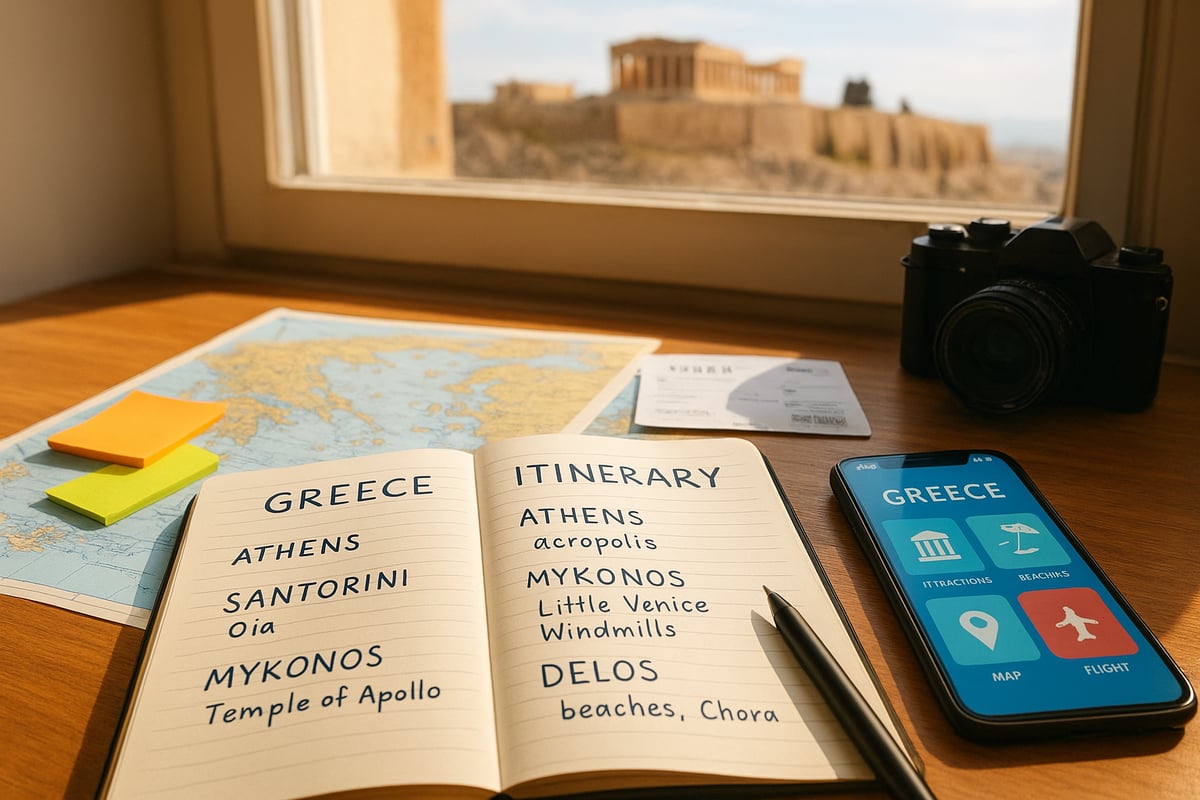Greece Travel Planner Guide: Your Essential Companion 2025
Imagine stepping onto sun-drenched islands, wandering through timeless ruins, and savoring Mediterranean flavors under the Grecian sun. Greece in 2025 invites you to embrace history, beauty, and adventure at every turn.
Whether you are planning your first visit or returning to explore new horizons, this greece travel planner is your trusted companion. It provides everything you need to design a seamless and unforgettable journey.
Inside, you will discover expert advice on must-see destinations, the best time to visit, budgeting tips, sample itineraries, and practical travel guidance. Let this guide help you turn your Greek dreams into reality.
Deciding When and Where to Go in Greece
Planning your dream adventure begins with the right timing and the perfect destinations. The greece travel planner can help you navigate Greece’s diverse climate, iconic sites, and trending experiences for 2025. Whether you crave sun-drenched beaches, vibrant city life, or tranquil villages, the choices are as endless as the Aegean horizon.

Best Times to Visit: Seasons & Events
Greece’s climate varies from the mainland’s temperate north to the sun-soaked islands in the south. Spring (April to June) and autumn (September to October) offer mild temperatures, fewer crowds, and blossoming landscapes. Summer, from July to August, is peak season with lively beaches and festivals, while winter provides a quieter side of Greece, especially in the north and mountain villages.
Here is a quick overview of average temperatures and rainfall by month:
| Month | Avg Temp (°C) | Rainfall (mm) |
|---|---|---|
| January | 10 | 56 |
| April | 16 | 31 |
| July | 29 | 6 |
| October | 20 | 38 |
High season brings vibrant events like Orthodox Easter and the Athens Epidaurus Festival, but expect higher prices and busier attractions. Shoulder seasons balance affordability with pleasant weather, perfect for your greece travel planner. Winter is ideal for cultural trips and discovering local life, though some islands are less accessible.
Each season has pros and cons. Summer offers energy and nightlife, but spring and autumn provide comfort and local flavor. The greece travel planner recommends matching your visit to the experiences you value most.
Top Destinations: Mainland & Islands
Greece’s destinations cater to every traveler’s dream. Athens dazzles with ancient ruins and eclectic neighborhoods. Santorini captivates with volcanic beaches and famous sunsets. Mykonos draws visitors for its nightlife and luxury, while Crete offers a rich blend of history, cuisine, and diverse landscapes.
Hidden gems like Naxos, Paros, and Meteora reward those who venture off the classic path. For more inspiration, see this Hidden gems in Greece guide to discover less-traveled wonders.
Comparing travel styles, island-hopping offers a blend of culture and relaxation, ideal for those using a greece travel planner to maximize variety. Mainland road trips suit history enthusiasts and adventurers who enjoy exploring by car.
Choose your destinations based on interests and travel pace. The greece travel planner helps you create a journey that fits your personal style.
How to Choose Your Ideal Greek Experience
Every traveler is unique, and the greece travel planner is designed to match itineraries to your preferences. Families often enjoy Crete for its beaches and history, while couples may find romance in Santorini or Paros. Solo travelers and adventurers might prefer the hiking trails of Meteora or the nightlife in Mykonos.
Consider thematic travel: food lovers can indulge in Athens’ culinary tours, while history buffs can explore UNESCO sites like Delphi. Decide between multi-stop itineraries for breadth, or immersive stays for depth.
Sample scenarios help clarify your choices. A seven-day trip could combine Athens and Santorini, while a two-week journey might include island-hopping and mainland highlights. The greece travel planner ensures your route aligns with your interests and travel style.
Key Travel Trends for Greece in 2025
Travel in Greece is evolving, and the greece travel planner keeps you ahead of the trends. Sustainable tourism is gaining ground, with eco-friendly hotels and local experiences more accessible than ever. Experiential travel is on the rise, encouraging deeper connections with Greek culture through cooking classes, village visits, and artisan workshops.
Emerging destinations like Ikaria and Syros are attracting attention, offering authentic alternatives to busier islands. According to recent tourism statistics, Greece welcomed over 35 million visitors in 2024, with projections indicating even greater growth in 2025.
With tourism flourishing, planning ahead with your greece travel planner ensures you enjoy the best of Greece while supporting sustainable and meaningful travel.
Budgeting and Cost Breakdown for Your Greek Adventure
Planning your budget is a critical step in any greece travel planner. Knowing what to expect financially helps you make the most of your journey without surprises. From accommodation and food to transportation and unique experiences, understanding costs ensures you travel with confidence.

Typical Trip Costs: What to Expect
When using a greece travel planner, it is essential to understand average expenses. Travelers can expect daily costs to vary based on travel style and destination. For 2025, here’s a general breakdown:
| Type | Budget (€) | Mid-range (€) | Luxury (€) |
|---|---|---|---|
| Accommodation | 30-60 | 80-150 | 200+ |
| Meals | 15-25 | 30-50 | 80+ |
| Transport | 10-20 | 20-40 | 60+ |
| Activities | 10-20 | 30-60 | 100+ |
Costs are higher on popular islands like Santorini and Mykonos, especially in peak summer. Mainland destinations offer more value for money. For a 7-day trip, a budget traveler might spend around €400–€600, while mid-range travelers should plan for €1,000–€1,400. For more detailed breakdowns, consult the Greece vacation planning guide to tailor your budget.
Saving Money: Tips & Strategies
A smart greece travel planner always looks for savings without sacrificing experience. Book flights and ferries as early as possible, especially for summer, to lock in lower fares. Traveling during shoulder seasons, like late spring or early autumn, means fewer crowds and better deals on accommodation and tours.
Take advantage of free attractions such as city walking tours, public beaches, and open-air festivals. Many museums offer discounted or free entry on certain days. According to recent travel aggregator reports, booking major transportation three months in advance can save up to 25 percent compared to last-minute rates.
- Book flights and ferries early.
- Travel in May, June, September, or October.
- Seek out free city tours and public events.
- Use public transport and multi-ride tickets for discounts.
With careful planning, your greece travel planner can help you maximize every euro.
Understanding Greek Accommodation Options
Accommodation is a key part of any greece travel planner. Choices range from budget hostels and guesthouses to boutique hotels and private villas. Airbnbs and traditional pensions are widely available, often providing a more authentic local experience.
Unique stays, like cave hotels in Santorini or historic inns in Athens, offer memorable alternatives to standard hotels. Prices fluctuate by location and season. On the islands, expect higher rates during July and August, while mainland cities like Thessaloniki and Nafplio usually offer year-round value.
When comparing options, a standard hotel room in Athens might cost €90 per night, while a family-run guesthouse could be just €60. Booking platforms such as Booking.com or Airbnb provide user reviews and loyalty programs, which can lead to further savings. Always cross-check deals to ensure your greece travel planner delivers the best value.
Managing Currency, Payments & Tipping
A successful greece travel planner includes understanding local payments. Greece uses the euro. Exchange rates are best at ATMs, which are widely available in cities and tourist areas. Credit cards are accepted at most hotels, restaurants, and shops, but some smaller tavernas and rural spots may require cash.
Keep some cash handy for taxis, local markets, or tips. Tipping is appreciated but not mandatory. In restaurants, rounding up or leaving five to ten percent is standard. For taxis, rounding up to the nearest euro is polite, and hotel staff appreciate small gratuities for good service.
Always check for any ATM transaction fees, especially for international cards. Carry a backup card in case of technical issues. By planning ahead, your greece travel planner ensures you handle currency, payments, and tipping with ease.
Step-by-Step Greece Travel Planning Process
Planning your Greek escape is a journey in itself. Breaking your trip into clear steps ensures nothing gets overlooked. Use this greece travel planner to turn your dream holiday into a seamless reality, with expert guidance at every stage.

Step 1: Research & Inspiration
Begin your greece travel planner journey by gathering inspiration from a variety of sources. Explore travel blogs, official guides, and social media platforms to visualize your adventure. Pinterest boards and YouTube vlogs can offer fresh perspectives on both classic and lesser-known destinations.
To streamline your decision-making, consult resources like the Top destinations in Greece, which provides a comprehensive overview of must-see locations. This approach helps you shortlist places that align with your interests.
Create a vision board, either digitally or physically. Pin images of historical sites, beaches, and local cuisine. This step clarifies your priorities and makes the rest of your greece travel planner process more focused.
Step 2: Booking Flights & Entry Requirements
Once you know where you want to go, your greece travel planner should focus on securing flights and checking entry requirements. Athens International Airport is the main gateway, but consider flights to Thessaloniki, Heraklion, or Santorini for direct access to different regions.
Check visa requirements based on your nationality. Most travelers from the EU, US, Canada, and Australia enjoy visa-free entry for up to 90 days under Schengen rules. Review current health regulations and COVID-19 updates for 2025, as requirements can change.
Compare direct and connecting flights. Direct routes are faster but may be pricier, while connections can offer savings. Book early, especially for high-demand periods, to secure the best fares in your greece travel planner.
Step 3: Building Your Itinerary
With flights booked, use your greece travel planner to design a balanced itinerary. Decide between a multi-stop adventure or a deeper stay in one area. Consider sample itineraries:
| Days | Sample Itinerary |
|---|---|
| 7 | Athens, Santorini, Mykonos |
| 10 | Athens, Naxos, Paros, Crete |
| 14 | Athens, Meteora, Thessaloniki, Islands |
Factor in ferry and domestic flight schedules, as travel between islands can take longer than expected. Use planning apps to track bookings and timeframes.
Build in downtime to savor local culture and spontaneous discoveries. A flexible greece travel planner ensures you enjoy must-sees while allowing for relaxation.
Step 4: Arranging Accommodation & Transportation
After your itinerary is set, your greece travel planner should cover where to stay and how to get around. Book hotels, guesthouses, or unique stays early, especially on popular islands or during festivals.
Choose between ferries, domestic flights, rental cars, and public transport. For island hopping, ferries are the backbone of Greek travel, with frequent routes in summer. On the mainland, car rentals offer flexibility for exploring historic sites and rural villages.
Check average ferry and flight frequencies for 2025. Booking transport in advance secures the best options and can save money. Use reputable booking platforms to compare prices and reviews as part of your greece travel planner.
Step 5: Packing, Health & Safety Preparation
Finalize your greece travel planner by preparing for a safe and comfortable trip. Pack according to the season: lightweight clothes for summer, layers for spring or autumn, and a windbreaker for island breezes.
Purchase travel insurance that covers health emergencies and trip interruptions. Check if any vaccinations are recommended for Greece. Save local emergency numbers and know the locations of hospitals or pharmacies near your accommodation.
For city breaks, opt for compact luggage, while island hopping benefits from backpacks or rolling suitcases. Secure valuables and be alert in crowded areas. With these steps, your greece travel planner ensures you are ready for every adventure Greece offers.
Navigating Greece: Transportation & Getting Around
Exploring Greece in 2025 is an adventure of its own, and choosing the right transportation makes all the difference. The Greece travel planner ensures you navigate the country’s diverse landscapes efficiently, whether you are island hopping or exploring the mainland. Each mode of transport offers unique advantages, and understanding your options will help you craft a seamless itinerary.

Domestic Flights, Ferries, and Island Hopping
Greece’s ferry network is world-famous, connecting the mainland with its dazzling islands. Major operators like Blue Star Ferries and Hellenic Seaways provide frequent routes, especially between Athens, Santorini, Mykonos, and Crete. High-speed ferries are available for those who value time, while traditional ferries offer a scenic, leisurely journey.
Domestic flights are an efficient alternative, especially for long distances or tight schedules. Airlines such as Aegean and Sky Express link Athens to islands like Rhodes, Corfu, and Heraklion. Booking early is essential during peak summer months, as demand rises sharply.
Consider the following comparison for your Greece travel planner:
| Route Example | Ferry (hours/cost) | Flight (hours/cost) |
|---|---|---|
| Athens to Santorini | 5-8 / €40-60 | 1 / €70-120 |
| Athens to Crete | 6-9 / €50-70 | 1 / €60-110 |
Choosing between a fast ferry and a traditional ferry depends on your priorities. Fast ferries save time but may cost more, while traditional ferries offer open decks and relaxed vibes. For detailed logistics, Greece transportation tips can help refine your Greece travel planner.
Public Transport, Car Rentals & Taxis
Public transport in Greece is reliable in major cities. Athens boasts an efficient metro, extensive bus networks, and modern trams. Thessaloniki and other urban areas offer regular bus services. Tickets are affordable, and schedules are frequent during the day.
Car rentals offer flexibility for travelers who want to explore at their own pace. To rent a car, you need a valid driver’s license (an International Driving Permit may be required for non-EU visitors). Insurance is recommended, and driving is on the right side of the road. Rural roads can be narrow, so drive cautiously.
Taxis are widely available, especially in tourist areas. Ride-hailing apps such as Beat and Uber (in select cities) provide convenience. In 2025, average car rental rates are expected to range from €35-€60 per day, while taxi fares start at €4 and rise based on distance. Your Greece travel planner should include estimated transport costs to avoid surprises.
Accessibility & Travel for All
Greece is making strides in accessibility, especially in cities and popular tourist destinations. Many metro stations in Athens and Thessaloniki are equipped with elevators and ramps. Major archaeological sites, such as the Acropolis, now offer accessible routes and facilities for visitors with mobility needs.
Families and seniors will find dedicated seating and priority boarding on ferries and public transport. Accessible taxis and shuttle services can be arranged in advance, particularly in larger cities and on well-visited islands.
Accessible beaches, like those in Crete and Naxos, offer ramps and special walkways leading directly to the sea. When building your Greece travel planner, look for accommodations and attractions that clearly state their accessibility features. This ensures a comfortable and enjoyable journey for all travelers.
Insider Tips for Smooth Travel
To keep your travels hassle-free, stay up to date on potential transport strikes, especially during busy seasons. Sign up for alerts or check local news before your journeys. Booking ferry tickets online is often more convenient and can secure better prices, though tickets are also available at ports.
Luggage storage services are available in major cities and ferry terminals, making day trips easier. For inter-island transfers, consider using port transfer services to avoid unnecessary stress.
Language barriers are minimal, as transport staff generally speak English, but learning a few Greek phrases can be helpful. Your Greece travel planner should include contingency plans for delays, such as alternative routes or flexible schedules. With thoughtful preparation, getting around Greece becomes an enjoyable part of your adventure.
Essential Greek Experiences: Culture, Food & Activities
Greece is a destination that engages all the senses. The greece travel planner is not complete without diving into the country’s legendary cuisine, vibrant culture, outdoor adventures, and its commitment to sustainable tourism. Let’s explore the essential experiences that will make your 2025 journey unforgettable.
Must-Try Greek Foods & Dining Etiquette
No greece travel planner would be complete without indulging in Greek cuisine. Savor moussaka, a rich layered eggplant and meat casserole, or bite into juicy souvlaki skewers. Fresh seafood, caught daily, is grilled simply and seasoned with olive oil and lemon. For dessert, flaky baklava offers a sweet finish.
Regional specialties add depth to your culinary journey. In Crete, try dakos (barley rusk salad), while Santorini is famous for its fava puree. Each region boasts its own cheeses, wines, and olive oils.
Dining in Greece is a social affair. Share meze (small plates) with friends at a local taverna, and remember that dinner starts late, often after 8 p.m. Food tours in Athens and Thessaloniki are perfect for discovering hidden gems and gaining insight into food traditions. The greece travel planner ensures you sample the best of Greek flavors.
Cultural Highlights & Local Traditions
Greece’s history comes alive at its UNESCO World Heritage Sites. Wander the Acropolis in Athens, explore the mystical ruins of Delphi, or gaze at the cliff-top monasteries of Meteora. These iconic sites attract millions of visitors annually, with Greece’s 2024 Tourism Statistics showing record-breaking interest.
Festivals are woven into the Greek calendar. Experience the Athens Epidaurus Festival for theater and music, or join in Orthodox Easter celebrations for vibrant processions and feasts. Traditional music, dance, and religious customs provide a window into local life.
A greece travel planner will help you time your visit to enjoy major cultural events. Dive deep into Greece’s traditions to enrich your travel experience.
Outdoor Adventures & Unique Activities
For those craving adventure, the greece travel planner spotlights outdoor activities to suit every interest. Hike the dramatic Samaria Gorge in Crete or ascend the legendary slopes of Mount Olympus. The Greek islands offer sailing, snorkeling, and windsurfing in crystal-clear waters.
Unique experiences await beyond the coast. Participate in olive oil tastings, pottery workshops, or guided village visits to connect with local artisans. Compare guided excursions, which offer expert insights, with independent adventures for flexibility and spontaneity.
Whether you seek adrenaline or cultural immersion, the greece travel planner ensures your itinerary is filled with memorable activities.
Responsible & Sustainable Travel in Greece
Sustainable travel is increasingly central to any greece travel planner. Support local businesses by shopping at neighborhood markets and dining in family-run tavernas. Choose eco-friendly accommodations, such as certified green hotels or traditional guesthouses using renewable energy.
Respect local customs and the natural environment. Use reusable water bottles, minimize waste, and follow trails to help preserve Greece’s stunning landscapes. Look for tours and businesses with sustainability certifications, which indicate a genuine commitment to responsible tourism.
By traveling thoughtfully, you contribute to the preservation of Greece’s culture and environment, enriching your own journey in the process.
Practical Tips & Resources for a Seamless Trip
Planning a trip to Greece in 2025 is easier and more enjoyable when you have the right resources at your fingertips. The greece travel planner approach ensures you are equipped for every step, from booking to exploring. Modern technology, expert advice, and local insights can make your journey truly seamless.
Travel Apps, Guides & Useful Websites
The right digital tools are essential for any greece travel planner. Start with apps like Google Maps for navigation, Rome2Rio for transport, and Ferryhopper for booking ferries. For language help, Google Translate and Greek-specific phrasebook apps are invaluable.
Official resources such as the Greek National Tourism Organization website provide up-to-date information on events, attractions, and travel advisories. Many travelers also rely on TripAdvisor for reviews and Booking.com for accommodation options.
As Greece climbs to new heights in global tourism, with Greece’s Global Tourism Ranking in 2025 reflecting its popularity, using trusted apps and guides is more important than ever for a smooth trip.
Health, Safety & Emergency Information
Prioritizing health and safety is central to your greece travel planner. Always save the emergency number 112, which connects you to all services in Greece. Keep a list of nearby hospitals and pharmacies in each city you visit.
For minor health issues, local pharmacies are well stocked and English is often spoken. Protect yourself from the Mediterranean sun with sunscreen and drink plenty of bottled water. Practice food hygiene by choosing reputable eateries and washing your hands frequently.
Travel insurance is a must for peace of mind. Carry copies of your passport, insurance policy, and emergency contacts. Knowing these basics ensures you can handle any situation confidently.
Staying Connected: SIM Cards & Wi-Fi
Reliable connectivity is a key part of any greece travel planner. SIM cards are widely available at Athens airport, kiosks, and phone shops. Major providers include Cosmote, Vodafone, and WIND. Choose prepaid data plans with enough gigabytes for navigation and communication.
| SIM Provider | Approx. Data (GB) | Price (EUR) | Where to Buy |
|---|---|---|---|
| Cosmote | 10 | 15 | Airport, shops |
| Vodafone | 8 | 12 | Kiosks, stores |
| WIND | 12 | 14 | Retail locations |
Wi-Fi is common in hotels, cafes, and public spaces, but speeds can vary, especially on smaller islands. Always secure your connection with a VPN for added safety.
Essential Greek Phrases & Etiquette Tips
Learning a few Greek words will enhance your experience and is a thoughtful touch in your greece travel planner. Common greetings include "Kalimera" (Good morning) and "Efharisto" (Thank you). For emergencies, "Voitheia" means "Help."
Cultural etiquette is important. Dress modestly when visiting churches and monasteries. Avoid raising your hand with the palm facing out, as it is considered rude. Always greet with a smile and respect local customs in each region.
A little language and cultural awareness go a long way, helping you connect with locals and experience authentic Greek hospitality.
As you map out your dream journey through Greece—balancing ancient history, sun-kissed islands, exquisite cuisine, and immersive cultural experiences—remember that the right planning can turn inspiration into reality. Whether you’re drawn to the vibrant streets of Athens, the romantic sunsets of Santorini, or the charm of hidden island gems, having expert guidance makes all the difference. If you’re ready to design a seamless, unforgettable adventure that’s tailored to your tastes and travel style, let us help you bring your vision to life. Start your journey today: Plan Your Luxury Greece Vacation for 2026
